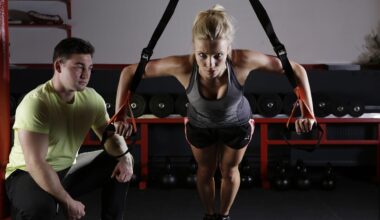Functional Fitness and Cross-Training: A Perfect Pairing
Functional fitness is a training philosophy that emphasizes strength, endurance, and mobility improvements in real-world scenarios. By integrating different training modalities, functional fitness enables one to perform daily activities more efficiently while also enhancing overall health. Cross-training, the practice of combining various exercise styles, complements functional fitness exceptionally well. It aids athletes and fitness enthusiasts alike in becoming well-rounded individuals. The combination improves balance, coordination, and flexibility, which translates into better performance in sports or everyday tasks. Furthermore, engaging in varied workouts reduces the risk of injury by preventing overuse of certain muscle groups. The blend of challenges presented by different styles of exercise keeps workouts fresh, stimulating, and enjoyable. This is crucial for long-term commitment to fitness goals. Individuals looking to explore their physical limits will find that employing cross-training techniques within functional fitness frameworks yields beneficial results. Overall, the pairing is not just effective — it’s transformative for anyone committed to enhancing their physical health and capabilities.
Enhancing Performance with Cross-Training
One of the significant advantages of cross-training within functional fitness is the enhancement of performance across diverse activities. Each cross-training discipline offers unique benefits that can significantly improve your physical output. For instance, adding swimming to a regimen primarily focused on weightlifting can increase cardiovascular endurance and lung capacity. Similarly, incorporating gymnastics-based movements can vastly enhance flexibility and core stability. This variance helps one adapt to different physical challenges, leading to improved performance overall. Athletes often engage in cross-training to simulate varied movements that they may encounter in a competitive setting. Moreover, as one becomes stronger in one discipline, the strength gained translates into others, establishing a solid base for a variety of activities. The strategic implementation of cross-training techniques facilitates muscle recovery by alternating workout focuses, preventing burnout. By diversifying exercises, you also keep motivation high, as monotony can often hinder progress. Overall, when combined effectively, the benefits of functional fitness and cross-training lead to enhanced performance, fitness, and overall well-being, making this approach highly desirable.
Incorporating flexibility training into your fitness routine can greatly enhance recovery times and prevent injuries. Engaging in exercises such as yoga or Pilates not only improves flexibility but also promotes balance and mental focus. When cross-training, ensuring adequate recovery is essential to prevent overexertion. By integrating recovery methods, you can remain on track with your goals while minimizing stress on your body. Adequate rest and recovery are just as important as the workouts themselves and can be overlooked. Understanding the body’s signals to prevent injury is vital during training cycles. Utilizing foam rolling and stretching techniques post-workout aids in muscle relaxation, enhancing overall performance. Moreover, mindfulness practices during flexibility sessions can significantly improve focus in high-intensity bouts. The partnership of diverse workouts with proper recovery yields a holistic fitness approach that benefits both body and mind. Adopting this comprehensive strategy prepares you for the physical demands of functional fitness and cross-training. With increased flexibility comes improved strength, leading to greater overall fitness success. Adaptability to various activities showcases the effectiveness of varied training techniques in optimizing performance.
The Mental Benefits of Cross-Training
Physical fitness is not solely about the body; mental wellness plays a vital part, too. Cross-training in functional fitness provides significant mental benefits, particularly through diversity in workouts. The variety both challenges the body and engages the mind, which helps combat workout boredom. When routines feel fresh and exciting, individuals are more likely to stick with their fitness plans. Moreover, mental focus is enhanced through cross-training, as participants must constantly adapt to new movements and techniques. This adaptability skill translates into daily life, fostering a problem-solving mindset essential in various situations. Additionally, achieving small victories in each workout fosters self-efficacy and motivation. Endorphins released during exercise contribute to improved mood and mental health, reinforcing positive habits. Furthermore, the social aspects of various fitness communities come into play, offering motivation and connection. Community support systems encourage individuals to push through challenges together, leading to lasting friendships and accountability. The synergy between physical and mental benefits creates a comprehensive wellness experience. Overall, this aspect confirms the significance of formal training programs focusing not only on body conditioning but also mental agility.
Nutrition goes hand-in-hand with functional fitness and cross-training. Proper nutrition is fundamental for optimal performance and recovery. The right fuel helps to support workouts and aid in muscle rebuilding after intense sessions. Cross-training requires adequate calorie intake—specifically from a balanced diet rich in proteins, healthy fats, carbohydrates, vitamins, and minerals. Protein is essential for muscle repair, while carbohydrates provide energy for high-intensity exercises. Moreover, hydration is a crucial component that often gets overlooked. Consuming adequate fluids before, during, and after workouts is vital for maintaining peak performance levels. Listening to your body’s nutritional needs allows for informed decisions regarding meal plans and supplementation. Whole foods should be prioritized over processed options to secure the best nutrient density. Creating a meal-prep schedule can help individuals stay on track, as convenience often leads to poor dietary choices. Additionally, consulting with dietary professionals ensures personalized strategies for fitness goals. Pay attention to your body’s responses to various foods and adjust meal timings around your training sessions. Focusing on the synergy of nutrition with functional fitness can significantly impact overall exercise outcomes.
Embracing the Journey of Cross-Training
Starting any new fitness program can elicit feelings of uncertainty, yet embracing the journey is vital to success. Many individuals find themselves intimidated when confronted with unfamiliar movements or routines. Understanding that growth occurs outside of comfort zones is essential to making meaningful progress. With cross-training, each workout becomes an opportunity to conquer challenges and develop resilience, increasing confidence along the way. Celebrating small achievements fosters an environment of positivity and drive. Tracking your progress through a journal can assist in maintaining motivation and accountability for your fitness journey. Additionally, seeking support from fitness communities can create a powerful motivator to stay committed to your goals. When faced with setbacks, stay composed and focus on the progress made thus far. Using setbacks as stepping stones toward success can strengthen both your body and mind. Finding joy in workouts reinforces belief in your capabilities and ultimately secures long-term adherence to fitness regimens. Adopt a positive mindset, as embracing each phase of the journey reveals transformative experiences that define your growth in functional fitness and cross-training.
Combining functional fitness with cross-training establishes a dynamic and adaptable workout strategy for achieving diverse goals. This synthesis facilitates holistic fitness that addresses strength, endurance, flexibility, and mental resilience. As the fitness landscape continues to evolve, integrating new training methods keeps your body well-prepared for various challenges. The key to a successful regimen lies in consistency and openness to change. Experiment with different exercises, assess personal enjoyment, and routinely adjust your program to reflect your evolving capabilities. Embrace the learning process associated with new techniques and movements, ensuring that every step enhances your overall fitness experience. Remember, the ultimate goal is not just fitness but cultivating a lifestyle centered on health and well-being. Explore your fitness potential by pushing limits and developing a well-rounded physique. This approach ensures you remain engaged and committed beyond conventional workout methods. Celebrate progress regularly, no matter how small, as every effort contributes to your health journey. Together, functional fitness and cross-training lay a foundation for balanced physical development, bringing essential benefits to people from all walks of life.


